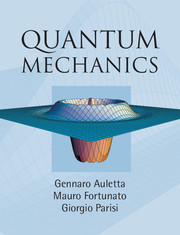Book contents
- Frontmatter
- Contents
- List of figures
- List of tables
- List of definitions, principles, etc.
- List of boxes
- List of symbols
- List of abbreviations
- Introduction
- Part I Basic features of quantum mechanics
- Part II More advanced topics
- Part III Matter and light
- Part IV Quantum information: state and correlations
- 14 Quantum theory of open systems
- 15 State measurement in quantum mechanics
- 16 Entanglement: non-separability
- 17 Entanglement: quantum information and computation
- Bibliography
- Author index
- Subject index
14 - Quantum theory of open systems
Published online by Cambridge University Press: 05 June 2012
- Frontmatter
- Contents
- List of figures
- List of tables
- List of definitions, principles, etc.
- List of boxes
- List of symbols
- List of abbreviations
- Introduction
- Part I Basic features of quantum mechanics
- Part II More advanced topics
- Part III Matter and light
- Part IV Quantum information: state and correlations
- 14 Quantum theory of open systems
- 15 State measurement in quantum mechanics
- 16 Entanglement: non-separability
- 17 Entanglement: quantum information and computation
- Bibliography
- Author index
- Subject index
Summary
In this chapter we shall deal with the quantum dynamics of an open system. By open quantum system we mean here a system which interacts with an environment (see Sec. 9.4): since we are not interested in the dynamics of the environment, we shall have to describe the evolution of the system in some “effective” way. In particular, if we consider only the evolution of the system, it will be non-unitary, and this will represent the subject of this chapter. As we know, Hamiltonian quantum dynamics is unitary and changes pure states into pure states. On the other hand, non-unitary dynamics changes an initially pure state into a mixture, which must be described by a density matrix (see Ch. 5). In the case of macroscopic systems, the coupling with the environment may be arbitrarily reduced and therefore its influence can be made correspondingly small (see Sec. 1.1). Microscopic systems, however, always couple to the environment and this coupling cannot be considered negligible. This is the reason why the quantum theory of open systems is one of the most important and fundamental chapters of quantum mechanics that, though born in quantum optics, has many implications in almost all fields of physics. The present chapter can be seen as a further development of the measurement theory (see Ch. 9), as open systems manifest a decoherent dynamics (see in particular Sec. 9.4).
- Type
- Chapter
- Information
- Quantum Mechanics , pp. 513 - 543Publisher: Cambridge University PressPrint publication year: 2009



